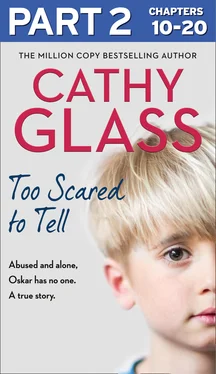I read him a bedtime story and took him up for his bath. That night I asked him – as I had been doing every night – if he wanted a goodnight kiss. To my surprise, he gave a small nod. ‘Here, like Mummy did,’ he said, pointing to the top of his head. I knew then how much that fleeting goodbye kiss from his mother had meant to him.
‘Does your mother kiss you goodnight?’ I asked.
‘No, she’s at work.’
‘What about your aunts and uncles?’
He shook his head.
‘So who sees you into bed?’
‘No one. I have a wash and get into my sleeping bag.’
A lump rose to my throat at the image of little Oskar, so young and vulnerable, taking himself off to his sleeping bag every night without a loving goodnight kiss or hug. ‘Do you want a hug as well?’ I asked as he snuggled down, but he shook his head shyly. I kissed the top of his head and, saying goodnight, came out and closed the door. It would be another month before he wanted a hug.
The following morning, the Guardian ad Litem (or Guardian as they are often referred to in child-care proceedings) telephoned me. Tamara Hastings had also been the Guardian for the two children I’d looked after just before Oskar and whose story I tell in Innocent .
‘I thought I recognized your name,’ she said. ‘How are you?’
‘Very well, thank you, and you?’
‘Yes, good. How is Oskar settling in?’
I told her more or less what I’d told Andrew, so she was up to date. We didn’t discuss the previous case as it wouldn’t have been appropriate. The Guardian is usually a qualified social worker and is appointed by the court in child-care proceedings for the duration of the case. They are independent of the social services but have access to all the files. They see all parties involved in the case, including the children, their parents and social services, and report to the judge on what is in the best interests of the child. The judge usually follows their recommendation.
Once I’d finished updating her, she made an appointment to visit us after school the following Monday. I noted it in my diary.
Andrew telephoned that afternoon and asked how Oskar had been after contact. He said he had stayed for half an hour and had also spoken to the contact supervisor this morning. I said Oskar had been quiet but that wasn’t unusual, and when I asked him what he and his mother had done he said they’d played with some board games. I then paraphrased the rest of what Oskar had said, including his comments about his mother working.
‘It appears that Roksana has always worked very long hours,’ Andrew said. ‘It may have impacted on their relationship. I appreciate that supervised contact isn’t a natural environment, but Roksana struggled to relate to her son and he to her. The contact supervisor said that Roksana was very worried about being late for work and mentioned this a few times, which worried Oskar.’
‘Yes, he told me that. I think Roksana is going to ask you about changing the times of contact.’
‘I haven’t spoken to her yet today, but I’m proposing contact will be three times a week, four to five-thirty. I’ve left a message on her voicemail to phone me. I think she’s seeing her solicitor this afternoon. If you don’t hear from me, assume the next contact will be on Friday at four o’clock.’
I made a note. ‘Roksana asked me if I could give her a lift to work after contact. I told her she’d need to speak to you first.’
‘OK, I’ll talk to her and let you know. Has Oskar said anything about his uncle hitting him?’
‘No.’
‘The contact supervisor said Roksana told Oskar not to say bad things about his uncles.’
‘I see. No, he hasn’t said anything to me.’
‘OK. Thank you.’
Roksana should have known better than to say that at contact. One of the reasons contact is supervised when there has been an allegation of abuse and care proceedings are current is to stop a parent threatening or coercing their child into withdrawing an allegation. Roksana wasn’t doing herself any favours.
An hour later Andrew telephoned again. I was now in the playground, waiting for the end of school. I moved away from the others so I couldn’t be overheard.
‘I’ve spoken to Roksana,’ Andrew said. ‘Because of her work commitments she can only see Oskar on Tuesday and Thursday for an hour – from four to five. Then she has to start the evening shift. I’ve checked with the Family Centre and there is a room free then. She has asked for phone contact on the other days, which I have agreed to, but I would like you to supervise it, so put your phone on speaker.’
‘All right. When does this new arrangement begin?’
‘Start the phone contact this evening, and then they will see each other next Tuesday and Thursday. Do you have Roksana’s mobile number?’
‘Yes, it’s in the placement information forms. What time should Oskar phone her?’ I asked.
‘Between five and five-thirty is good for her, or after ten, but I’m guessing Oskar will be in bed by then.’
‘Yes, he goes up around seven. And the lift home she wanted?’
‘It won’t be necessary with these new arrangements.’
‘OK.’
I ended the call with a heavy heart. A parent who was fighting to get their child back should be demanding more contact, not less. Andrew had offered Roksana three ninety-minute sessions a week and she’d cut it to two sessions of an hour each. Yes, she had to work and she was gaining phone contact, but it wouldn’t be viewed in a positive light. The inference could be drawn that if Roksana wasn’t able to make time to see her child while he was in care then she was unlikely to have the time to successfully parent him if he was returned to her.
I obviously didn’t tell Oskar this when he came out of school. I began by asking him if he’d had a good day, and he replied, ‘Yes. I like school.’
‘Excellent.’
As we walked to the car I told him I’d spoken to Andrew and then explained the new contact arrangements in a positive light. ‘So you will be seeing your mother twice a week and speaking to her on the phone on the other days,’ I said.
‘Will I have to speak to my uncles?’ he asked quietly.
‘No. Just your mother.’ I unlocked the car door. ‘Why? Do you want to speak to your uncles?’
‘No.’
Before I started the engine, I swivelled round in my seat so I could see Oskar. ‘I’ve looked after a lot of children,’ I said. ‘And I get a sense when something is wrong. If there is anything worrying you, I think it would help if you could tell me.’
He shrugged.
‘I know when you saw Mummy yesterday she asked you not to talk about when your uncle slapped you, but it is important you tell.’
‘He did slap me!’ Oskar blurted. ‘I told Miss Jordan the truth.’
‘Yes, I believe you, so did she.’
‘Mummy doesn’t,’ he said, his face falling. ‘She thinks I made it up.’
‘I know, it’s difficult for her. Why do you think she would say that?’ I asked.
‘Because I don’t like being left alone with those men. Some are nice, but others aren’t.’ It was the most Oskar had said and I wanted to learn as much as possible before he clammed up again.
‘Which men are nice?’ I asked.
‘Uncle Nowak.’
‘Anyone else?’
‘Some are OK.’
‘Who isn’t nice?’
Silence.
‘Do you know their names?’
He looked thoughtful and then shook his head. ‘I can’t remember.’
‘OK. If you do, tell me, please.’
Andrew had said we should telephone Roksana between 5.00 and 5.30, so shortly after 5.00, with Oskar sitting beside me, I made the call, blocking the caller identity on my landline. Roksana wasn’t to be given my contact details. It went through to voicemail, so I left a message. ‘Hello, it’s Cathy, Oskar’s carer. Andrew said to phone. I’ll call you back in ten minutes.’ I knew that many people didn’t answer their phones if the number was withheld. I explained this to Oskar.
Читать дальше












